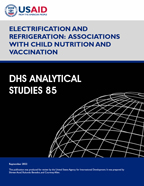There is no printed copy available to order.
Abstract:
Ensuring universal, equitable, and reliable
access to electricity is a Sustainable
Development Goal (SDG) for 2030. Although
more than a billion people have gained access
to electricity since 2010, nearly 760 million
still do not have any access and millions
more do not have reliable access. Previous
research has found positive associations
between access to electricity and health
including reduced infant mortality and
improved quality of and access to care. This
study examines the association between
electricity access and refrigerator ownership
with underweight children under age 5 and
children age 12–23 months who did not receive
the first DPT vaccine (zero-dose children).
The study uses 54 DHS surveys from 15 sub-
Sahara African countries. We examine trends
in electricity access, refrigerator ownership
among those with electricity, underweight
children, and zero-dose children. Trend
results show improvements in access to
electricity, refrigerator ownership,
underweight, and zero-dose children in
several countries. However, there are
countries with high levels of underweight,
zero-dose children, and low levels of
electricity, and there are large disparities
between urban and rural areas. Further
analysis shows a significant negative
relationship between electricity access and
underweight, even after controlling for
child, mother, and household variables. There
were less significant findings between zero-
dose children, electricity, and the
refrigeration models. The associations were
not consistent over time, were not always
found in the most recent survey, and/or were
not significant in both the urban and rural
areas in each survey. When significant
associations were found, the disparities in
the outcomes were relatively large between
children with/without electricity and a
refrigerator in the household. The study
highlights the need for expanding electricity
access, especially in rural areas, as well as
further study to understand the pathways
between electricity and child health
outcomes.
 Electrification and Refrigeration: Associations with Child Nutrition and Vaccination (PDF, 3625K)
Electrification and Refrigeration: Associations with Child Nutrition and Vaccination (PDF, 3625K)
 Electrification and Refrigeration: Associations with Child Nutrition and Vaccination (AS85) - Analysis Brief
Electrification and Refrigeration: Associations with Child Nutrition and Vaccination (AS85) - Analysis Brief
